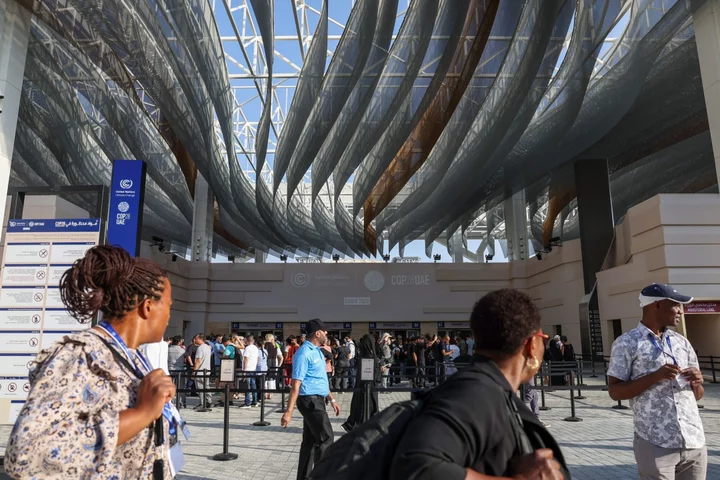COP28 Daily Reports: Sign up for the Green Daily newsletter for comprehensive coverage of the climate summit right in your inbox.
Nearly 200 nations are set to agree on details for running a fund designed to help vulnerable countries deal with more extreme weather stoked by global warming, marking a major breakthrough as international climate negotiations open in Dubai.
Delegates at the COP28 summit are preparing to adopt a framework for the Word Bank to at least temporarily operate the so-called Loss and Damage Fund by the end of Thursday. With expected announcements of financial contributions in coming days, the program could start disbursing money early next year.
“There is the opportunity to walk away from here with a truly historic decision,” said Simon Stiell, executive secretary of the United Nations Framework Convention on Climate Change that runs the annual COP meetings. Reaching an agreement on loss and damage early “will send a powerful signal to all of the negotiating rooms.”
Read More: What Is COP28 and Why Is It Important?
Still, the expected milestone belies many thorny challenges ahead. The plan for starting up the loss and damage fund is one of three main negotiated outcomes COP28 is working to deliver over the next two weeks. That includes how countries should react to sobering warnings about the inadequate pace of efforts to slash greenhouse gas emissions, which will likely lead to sparring over what nations should collectively commit to do about fossil fuels in a warming world.
There also are major questions still hanging over the loss and damage facility itself, including the source and scale of funding. Emerging economies argue that countries which industrialized first should make significant contributions, given they’re responsible for much of the greenhouse gas emissions accumulated in the atmosphere.
The draft text being considered on Thursday lays out a plan for replenishing the fund every four years, with contributions coming from a “wide variety of sources,” including grants and concessional loans. But it stops short of demanding contributions, merely urging countries to provide that support “on a voluntary basis” and inviting developed nations “to take the lead” to provide seed money.
“It is crucial to simultaneously enhance its financial scope — necessitating hundreds of billions of dollars annually — and establish a process for initial capitalization and periodic replenishment,” said Harjeet Singh, head of global political strategy at Climate Action Network International. “This step is essential to efficiently channel funds to those battling climate catastrophes.”
In coming days, several rich countries are expected to announce contributions to help fulfill a $200 million minimum necessary for the World Bank to launch operations. The UK is set to pledge money, the European Union has promised “substantial contributions” and COP host the United Arab Emirates will also promise support, said people familiar with the matter who asked not to be named before an official announcement.
Read More: Biggest Climate Talks Ever Confront Global Chaos and Record Heat
John Kerry, the US special presidential envoy for climate, said the country would provide several million dollars at the Bloomberg New Economy Forum in Singapore in early November, but has not provided specifics. The US fought to ensure the framework text made contributions voluntary, and Kerry has emphasized the US already provides disaster relief funding through other channels.
“It’s important the fund does not represent any expression of liability” or “any sort of new legal requirements,” Kerry told reporters Wednesday. “We think that this fund — the way it’s designed — will meet the needs of vulnerable countries,” and “can be stood up quickly but confidently.”
It’s taken nearly a year to hammer out details for the fund, which nations resolved to create at the end of the COP27 summit in Egypt. Representatives from nearly two dozen countries negotiated on specifics for months, including on the controversial decision to set it up as a financial intermediary fund hosted by the World Bank on a four-year interim basis.
Author: Jennifer A. Dlouhy and John Ainger

